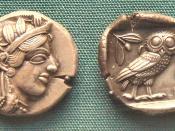It is better to rise from life as from a banquet, neither thirsty nor drunken - Aristotle
The term moderation can be summarized simply as the process of eliminating, or lessening extremes. It is used to ensure normality throughout the medium on which it is being conducted. But moderation is also a principle of life. So much is its significance, that in ancient Greece, the temple of Apollo at Delphi bears the inscription Meden Agan or 'Nothing in excess'. But if this key concept is to be incorporated in every aspect of a righteous life, the question raised is of how one can master the art of moderation. Sophrosune is a Greek philosophical term meaning 'moral sanity' and from there, self control or moderation. The idea of moderation, which also happens to be part of the four "cardinal virtues" suggests happiness obtained when one's philosophical needs are satisfied, resembling the idea of enlightenment through harmonious living.
It is clear that Sophrosune is a central and predominant principle of the Athenian society.In Book VIII of The Laws, The Athenian Stranger asserts that:
"It won't be surprising if the legal customs ordained earlier should predominate over the mass of desires: the fact that it's impossible to get terrifically rich is no small benefit to moderation; the education as a whole has well-measured laws that promote such things; and in addition, there is the trained eye of the rulers which never looks elsewhere but is always watching things, including the young themselves, so as to limit the other desires as much, at least, as is humanly possible".(836a)
One of the concepts covered in the first Books of Plato's Laws is that of man being a puppet of the Gods "put together for their play". The idea is that we are...


